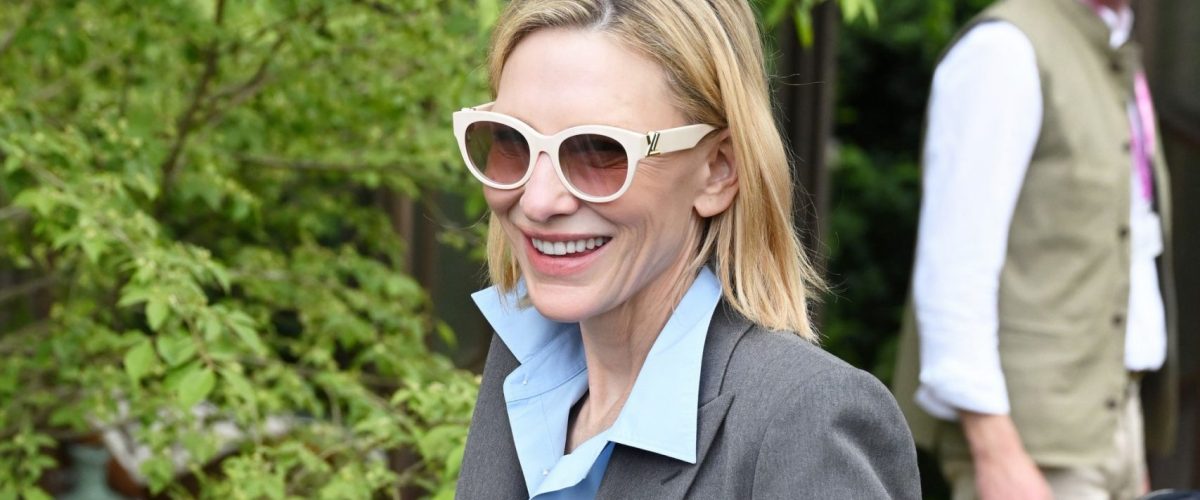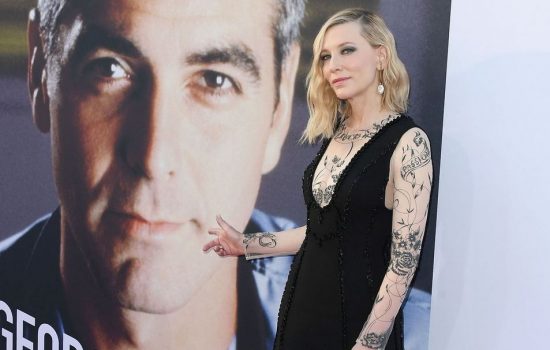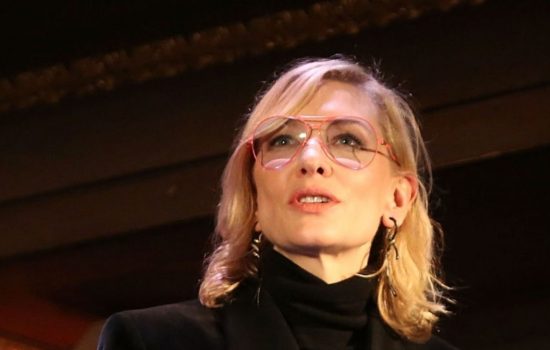Cate Blanchett was at the Chelsea Flower Show with her mother, June Blanchett, and friend and hair stylist, Sam McKnight on Monday, 19 May. Cate is on Ruthie’s Table 4 podcast to talk Toku Sake and growing her own food in her garden.
BLACK BAG is showing in cinemas in Germany and Rumours in German-speaking territories so check them out, there are new interviews below.
BOZO OVER ROSES is part of the lineup at Sydney Film Festival and Raindance Film Festival in the UK, tickets are on sale now: SFF screenings here, Raindance screenings here.
Thank you to Sallie K. and Leigh W. for their donation to the site. The site hosting renewal to keep the site open is near and if you would like to donate you can follow the details here. We appreciate any amount.
Chelsea Flower Show
Cate visited the gardens: Save for a Rainy Day Garden designed by Baz Grainger for Killik & Co. and The King’s Trust Garden: Seeding Success designed by Joe Perkins. More info about the event here.
@whowhatwear.uk Hey Cate ? #chelseaflowershow #london #cateblanchett #thingstodoinlondon
People ask me who my dream guest would be on Ruthie‘s Table 4. Cate Blanchett has always been top of the list – an actor, director and vocal activist for values and ideas close to my heart.
Cate lives with purpose in the countryside in East Sussex, keeping bees, growing vegetables in her garden, cooking and eating seasonally.
Here we are at The River Cafe on the beautiful first day of summer weather. The sun is shining, the chefs are cooking and the garden is flowering. Cate and I are going to talk about our shared love of food, family and art. As a special treat, I even asked her to bring a bottle of Toku, the saké brand for whom she is creative director, and get to sample what makes it so special. A dream come true indeed.
Mary Greenwell has shared a photo on the day they recorded the episode.
Interviews
Google translated from German to English.
Some parts of the interview for Black Bag.
Ms. Blanchett, in your new film “Black Bag,” you play a secret agent. What would you say it takes to be a good spy?
Nerves of steel are the most important requirement. I also think you have to be a fairly flexible, adaptable person. I can’t imagine someone who lives life in a very rigid and strict manner doing this job particularly well. Because you have to switch back and forth between different scenarios, worlds, and personalities with great ease, so it’s hard to be inflexible.The film, which has been showing in German cinemas since Thursday, is also a marriage story and tells of the pitfalls that lie when two spies are married. But being in a relationship with a “civilian” might be even more difficult, right?
I also think the latter is anything but easy. But at the same time, there are some amazing relationships that work against all odds. Think of Mary Matalin and James Carville: She was in charge of George Bush’s campaign, he was an advisor to Bill Clinton, and yet they’re still married today. Ultimately, what matters most is being able to trust that your partner would never do anything to hurt you.But if your job doesn’t always allow you to tell the truth, that complicates things a lot.
No question about it. Although the truth in interpersonal relationships is always a matter of timing. I’ve had a few friendships in my life with people who relied on radical honesty. There were definitely situations where I asked myself whether the honesty was actually meant to benefit me and the friendship, or whether it was basically just selfish. My husband and I have been married for 27 years, and I can say that our recipe for success is that we always have each other’s best interests at heart. That doesn’t mean we don’t argue. And maybe we have a secret that we don’t share. But we don’t compete with each other; we always have each other’s backs.So you always see yourselves as a couple?
Yes, but you also shouldn’t lose yourself in the process. In the end, everyone dies alone, no matter how many people they’re around. That’s why you have to stay true to yourself first, then to your relationship. If a couple merges so much that they lose their individual identities, that’s not healthy either. This mixture of independence on the one hand and devotion to one another on the other, which the couple at the center of “Black Bag” demonstrates, is truly my ideal relationship.You were recently on stage in London, in a production of Chekhov’s “The Seagull” by Berlin director Thomas Ostermeier. Appropriately, you told a British newspaper that, if in doubt, you would choose theater over cinema. Why?
That’s a very general simplification. There are enough exceptions to this rule. With outstanding directors, from Soderbergh to Martin Scorsese and David Fincher to Jane Campion, this question doesn’t arise for me. I would work with them anytime, anywhere. But what I love so much about stage work and what I actually always miss when I’m not acting for a while are two things. On the one hand, of course, there’s the direct connection you feel with the audience every night. But on the other hand, there’s also the fact that you work on something together as a group over a long period of time – from the weeks of rehearsals to the nightly performances.In addition to “Black Bag,” you can currently be seen in “Dance of the Titans” in the cinema; last year you played the leading role in the series “Disclaimer,” and Jim Jarmusch’s new film is coming soon… It’s hard to believe that you keep flirting with the idea of ??retiring.
Am I flirting with it so much? Let’s put it this way: I can actually imagine my life without acting. I mean that quite seriously. I wouldn’t feel like I was going crazy. But of course, I’m saying that today, in theory. If push comes to shove tomorrow, things could look completely different.Full interview on FAZ
Note: The German title for Rumours is “Tanz der Titanen” which translates to “Dance of the Titans” in English.
23 night shoots for “Dance of the Titans” in the forest: What was that like?
To be honest, when director Guy Maddin asked us to do it, I assumed we’d be filming at his place in Winnipeg. And then we ended up in the woods in Budapest, doing a five-week night shoot. It wasn’t quite what I expected. But there’s a certain magic to it; you live in a completely different time zone. Then you wake up at 2 p.m.—well, I woke up a little earlier because I had the kids with me—but it was a bit like a pajama party.Aren’t we already in the middle of the apocalypse?
This setting, this atmosphere, even this tone seems much more plausible now than it did 15 years ago. But you also have to address the collective fear that every thinking person is feeling right now. And at the same time, people should be able to laugh about it, maybe leave the cinema a little refreshed, a little more focused. But at times it did feel more like a documentary. Systemic injustice isn’t funny, but we need to talk about it, not pretend it’s someone else’s problem. That’s what I love about cinema: it challenges you to engage with worlds that someone else has imagined. This film is a comedy, a satire, a tragedy, an episode of “Scooby-Doo,” a zombie film, and a Mexican soap opera all at once. It’s very playful, wicked, cheeky, but it also has a soul and a longing, like all of Guy Maddin’s films.Are you an optimist yourself?
I guess I’m an optimistic pessimist, in the sense that you have a plan for the worst case scenario but at the same time hope for the best.Cinema offers this kind of discussion of topics. Artificial intelligence cannot.
We’ll never be able to reproduce what is deeply human. That’s why all those middle-aged billionaires are trying to fly to Mars: They don’t want to face the fact that they, too, will die one day. AI can only reproduce a synthetic understanding of this. But it poses a major threat.Your character is very much dominated by her costume and hairstyle.
There are so few examples of female leadership in politics. There are certain symbols that are used: colors can’t be too flashy, hair has to be styled a certain way—it’s a whole iconography, and how these women have to rehearse and use these male gestures—there’s a world of difference between themselves and how they present themselves in public. Their voices also change. This construct lends them a certain artificiality as people. As citizens of our countries, it’s also our responsibility to decide what kind of leadership style we enable.We build people in politics, but also stars.
Yeah, right! The first time I went to Cannes with a small Australian film, I got elbow injuries from people trying to get through to the stars. And two years later, I was escorted down the red carpet like a gladiator, and the others were pushed aside. It’s completely surreal. It’s all smoke and mirrors. We’re a strange species.Interview with Kleine Zietung
Bozo Over Roses
View this post on Instagram
View this post on Instagram







 A Manual for Cleaning Women (202?)
A Manual for Cleaning Women (202?) Father Mother Brother Sister (2025)
Father Mother Brother Sister (2025)  Black Bag (2025)
Black Bag (2025)  The Seagull (2025)
The Seagull (2025) Bozo Over Roses (2025)
Bozo Over Roses (2025) Disclaimer (2024)
Disclaimer (2024)  Rumours (2024)
Rumours (2024)  Borderlands (2024)
Borderlands (2024)  The New Boy (2023)
The New Boy (2023) 











